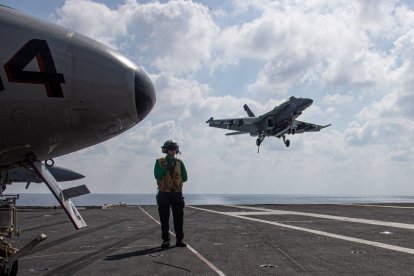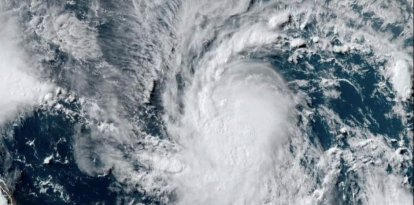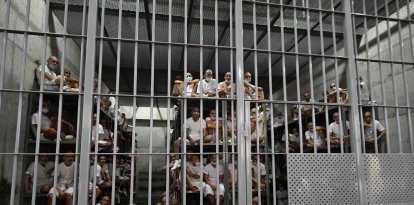Tension in the Middle East increases: US to send fighter jets to the region
According to a report by The New York Times, the decision was made to help Israel defend itself following threats made by Iran and its terrorist allies over the death of the Hamas political leader in an attack in Tehran.

A U.S. aircraft in the eastern Mediterranean Sea
The United States is preparing to send more fighter jets to the Middle East, reported The New York Times Friday. This follows threats by Iran and its terrorist allies in Gaza, Lebanon and Yemen to attack Israel soon in retaliation for the death of Ismail Haniyeh, leader of Hamas's political bureau, in an offensive in Tehran this week.
The newspaper quoted senior U.S. officials as saying that it has not yet been decided how many aircraft will be sent to the region.
The officials remarked that the U.S. plans to send enough of the right type of aircraft as soon as possible to help Israel defend itself, while taking the necessary precautions so that U.S. action is not seen as an attempt to escalate the conflict.
On the other hand, AFP reported that Hezbollah could initiate a solo attack after an offensive by terrorist factions in Syria, Yemen and Iraq.
It should be noted that prior to Haniyeh's death, Israel eliminated Fuad Shukr, Hezbollah's No. 2, in Lebanon.
U.S. President Joe Biden had a dialogue Thursday with Israeli Prime Minister Benjamin Netanyahu about new U.S. military deployments.
How did the U.S. assist Israel in Iran's recent direct attack on the Jewish state?
Following the alleged Israeli attack more than four months ago in Syria, in which three Iranian Revolutionary Guard Corps. commanders were killed, the Islamic Republic's military launched more than 300 drones and missiles against Israel. However, only a handful managed to penetrate Israel, causing minor damage.
U.S. Air Force aircraft in Jordan and Saudi Arabia along with French, Jordanian and British aircraft succeeded in intercepting more than 80 drones.
Iran announced the attack early enough for the Pentagon to move additional fighter jets and Navy ships to the area, while U.S. commanders negotiated access to airspace for the aircraft to operate, and coordinated the deployment of ground-based air defense batteries to help defend Israel.
Officials further stated that it is unclear whether Israel and its allies will have enough time to prepare for a new round of large-scale Iranian attacks.
American Jews trust the IDF more than Israelis
A survey conducted by the Jewish People Policy Institute (JPPI) reveals significant trends among Jews in the United States regarding confidence in Israel's victory in its war against Hamas and optimism about the country's future.
According to the poll results, members of the Jewish community in the United States show greater confidence in Israel's ability to win the war than Israeli Jews.
Fifty-five percent of Jews in the United States rated their confidence in Israel's victory at high levels (4 or 5 on a scale of 1 to 5), compared to 41% of Jews in Israel, while only 19% of Jews in the United States expressed low confidence in victory (rating 1 or 2), compared to 35% of Jews in Israel.
Jews in the U.S. were also more optimistic than Israeli Jews about the future of Israel, which is even higher than the optimism they expressed about the future of the Jewish people globally and in the U.S. in particular.
Another important finding of the survey reveals that conservative and religious people tend to be more optimistic than more progressive people. In this regard, regarding Israel's future, those who consider themselves conservative rated their optimism at 4.27 (on a scale of 1 to 5) and the very conservative at 4.11, while those who define themselves as leaning progressive or very progressive gave a score of 3.22 and 2.88, respectively.
RECOMMENDATION




















